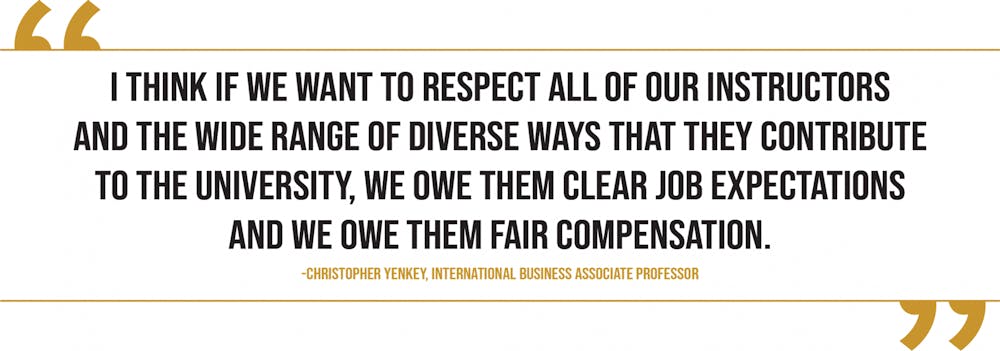The faculty senate debated expanding its voting eligibility to untenured faculty and discussed unpaid labor during its meeting on Wednesday in the Booker T. Washington Auditorium.
Currently, untenured faculty cannot vote on faculty senate proposals unless permitted by “existing or future bylaws and/or policies of the academic unit,” according to the current faculty manual text. A proposal that was scheduled for discussion at the last faculty senate meeting on April 5 but postponed to Wednesday aims to remove this exception on untenured faculty’s voting rights.
In response, associate professor of English and faculty senator Mark Minnett proposed an amendment that would expand eligibility to vote and serve on institutional governmental bodies like the faculty senate to all full-time faculty “based on the same criteria.” However, only tenured faculty would be able to vote on tenure and promotion matters.
For example, the proposal would allow faculty who conduct research to vote on matters proposed by the faculty senate to vote on proposals related to research, or faculty who only teach to vote on matters related to teaching. However, the amendment failed by a vote of 33 for and 41 against.
Computer science and engineering professor Marco Valtorta cited a 2014 survey with an over 50% response rate which documented concerns about tenure track from non-tenured faculty at the time. He believes that voting rights and tenure are both signs of respect and that the revision will instead exclude some faculty, the opposite of what it intends.
“The major concern expressed was lack of respect for non-tenure-track faculty,” Valtorta said. “I’m afraid that this language may, could be used to create subgroups of faculty who are excluded.”
Mark Macauda from the Core for Applied Research and Evaluation said he supports the spirit of the language but echoed Valtorta's concerns about how units could interpret it.
"(Certain departments) could create a criteria that would include only tenure-track faculty," Macauda said. "Like saying 'to vote on this you have to be teaching and researching in an equal measure, which would automatically cut out research faculty like myself."
Associate professor of international business Christopher Yenkey said he doesn’t believe voting rights are related to respect, but that respect comes from giving each worker a clear job.
“I advise my dean’s office on two issues, and I advise the president and the provost on a wide range of things. I don’t get to vote on any of them. Why do I not feel disrespected?” Yenkey said. “I think if we want to respect all of our instructors and the wide range of diverse ways that they contribute to the university, we owe them clear job expectations and we owe them fair compensation.”

Despite attempts to allow faculty members to vote on what happens in their department, English professor Aaron Dicker points out that the proposal that allows service or involvement in governmental procedure leaves the potential for unpaid labor since a portion of many members' contracts requires some sort of service. That service requirement can be fulfilled by governmental procedure.
"I think we absolutely know the consequences if this passes or not," Dicker said. "We're talking about mandating service if individuals get the right to vote."
If a professor is voting on a matter that specifically concerns their job expectations, they would not get paid for fulfilling service per contractual requirements as faculty.
The amendment from April 5 for faculty voting rights revisions was ultimately called to question, and debate will continue next fall instead of at the next faculty senate meeting in June to allow for the most attendance.
"Our next meeting is in June, and it does not require a quorum, and I don't think that's an appropriate place to continue with the deliberations on these faculty manual changes, so we're going to wait until the fall," faculty senate chair and management professor Audrey Koorsgaard said. "I do hope to see some of you or many of you, hope you're compensated for it, at the June meeting."

